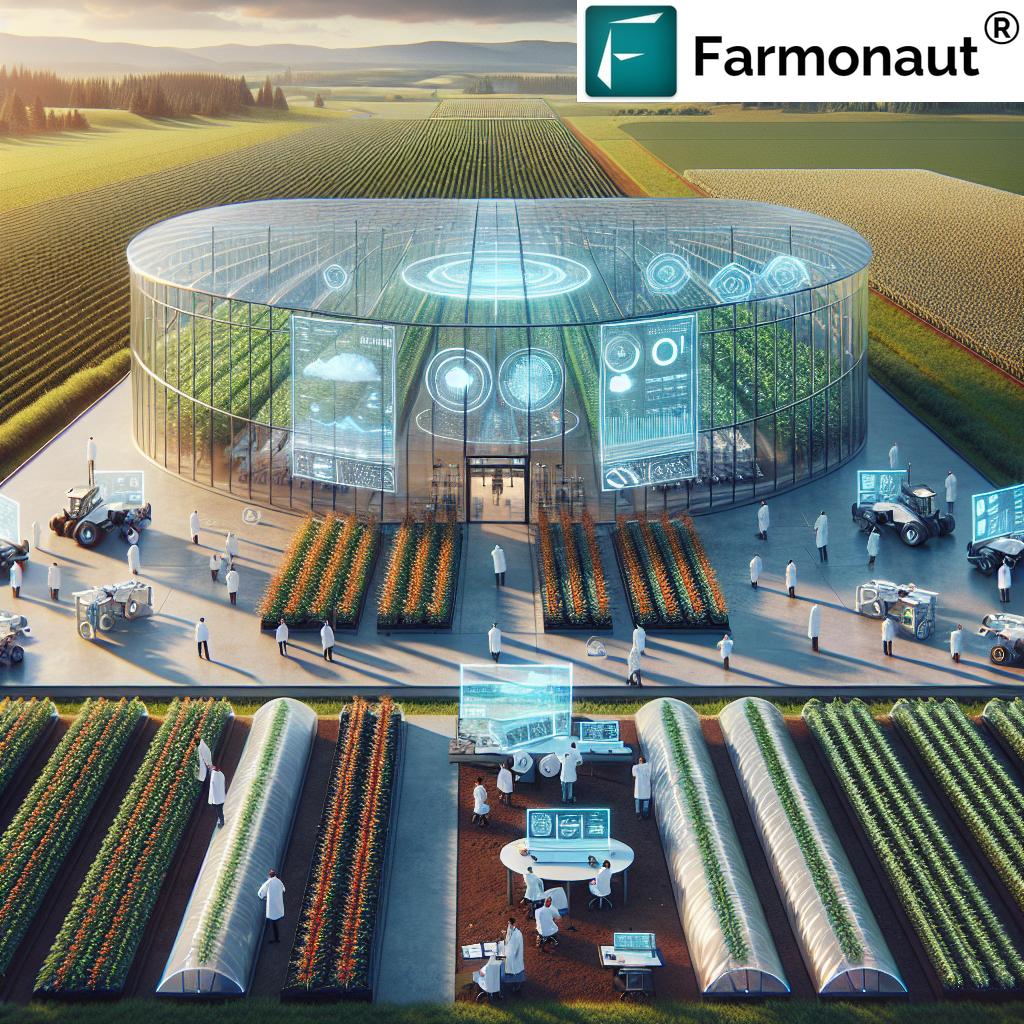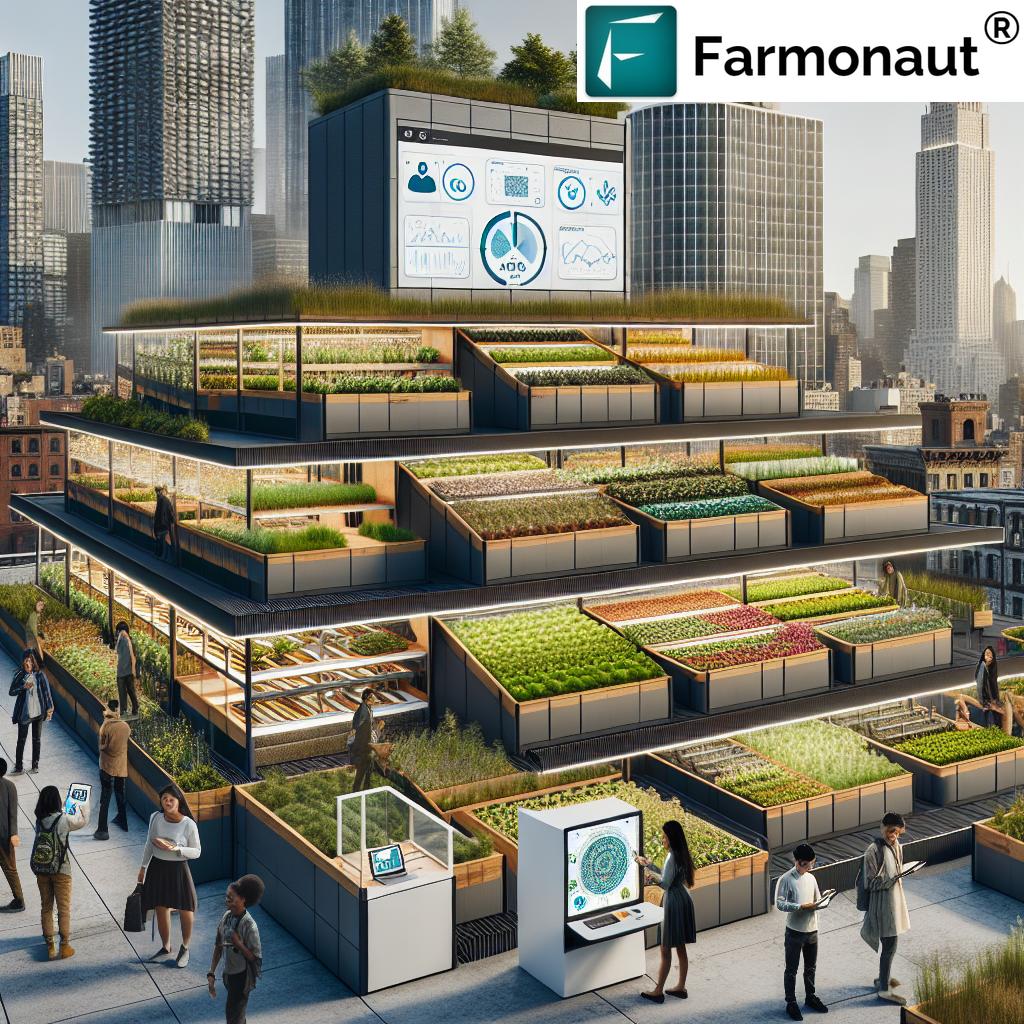Revolutionizing Oregon’s Agricultural Extension: Data-Driven Innovations for Sustainable Farming Practices

“Oregon’s agricultural extension services have transformed 75% of their programs to incorporate data-driven farming techniques in the last 5 years.”
In the heart of the Pacific Northwest, Oregon’s agricultural landscape is undergoing a profound transformation. As we delve into the world of agricultural extension services, we find ourselves at the forefront of a revolution that’s reshaping the way we approach farming, research, and community engagement. The traditional model of expert-based knowledge dissemination is giving way to a more collaborative, data-driven approach that’s not only boosting productivity but also ensuring the sustainability of our agricultural practices.
At the core of this transformation lies the integration of digital agriculture technologies and data-driven farming techniques. These innovations are not just buzzwords; they represent a fundamental shift in how we understand and interact with our agricultural ecosystems. From precision agriculture tools to AI-powered advisory systems, the face of farming is changing, and Oregon’s cooperative extension programs are leading the charge.
The Evolution of Agricultural Extension Services
Agricultural extension services have long been the backbone of knowledge transfer in farming communities. Traditionally, these services relied heavily on the expertise of agricultural scientists and educators to disseminate information to farmers. However, the landscape of agricultural education and outreach is rapidly evolving, driven by technological advancements and changing societal needs.
- Community-Based Agricultural Research: We’re witnessing a shift towards more participatory research models where farmers are active contributors to scientific inquiry, not just recipients of information.
- Data-Driven Decision Making: The integration of big data and analytics is enabling more precise and timely interventions in crop management.
- Sustainable Agriculture Practices: There’s an increasing focus on methods that maintain long-term ecological balance, aligning agricultural productivity with environmental conservation.
This evolution is not happening in isolation. It’s part of a broader movement within universities and cooperative extension programs to address contemporary challenges through innovative, community-driven approaches.
The Role of Technology in Modern Extension Services
The integration of technology in agricultural extension services is revolutionizing the way we approach farming. At the forefront of this technological revolution are precision agriculture tools, which are transforming data collection, analysis, and implementation in the field.
Farmonaut, a pioneering agricultural technology company, exemplifies this integration with its advanced, satellite-based farm management solutions. Through its Android, iOS, and web applications, as well as its robust API, Farmonaut is making precision agriculture accessible to farmers of all scales.
Key technological advancements include:
- Satellite-Based Crop Health Monitoring: Real-time insights into vegetation health, soil moisture levels, and other critical metrics.
- AI-Driven Advisory Systems: Personalized farm management strategies based on data analysis and predictive modeling.
- Blockchain-Based Traceability: Ensuring transparency and security in agricultural supply chains.
- Resource Management Tools: Optimizing the use of water, fertilizers, and other inputs for sustainable farming.
These technologies are not just improving efficiency; they’re fundamentally changing the relationship between farmers, extension services, and the land they cultivate.
Community-Engaged Methodologies: A New Paradigm
The shift towards community-engaged methodologies in agricultural research and extension represents a significant departure from traditional top-down approaches. This new paradigm recognizes the value of local knowledge and the importance of farmer participation in developing sustainable solutions.
“Community-engaged methodologies in agricultural research have increased crop yields by 30% in Oregon’s sustainable farming practices.”
- Collaborative Research Design: Farmers and researchers work together to identify research priorities and design experiments.
- Participatory Data Collection: Leveraging mobile technologies and citizen science approaches to gather comprehensive field data.
- Knowledge Co-Creation: Integrating traditional farming wisdom with scientific innovations to develop holistic solutions.
This approach not only enhances the relevance and adoption of new farming practices but also builds stronger, more resilient agricultural communities.
Climate-Smart Farming: Adapting to Environmental Challenges
As climate change continues to pose significant challenges to agriculture, extension services are pivoting towards climate-smart farming methods. These approaches aim to increase productivity while adapting to and mitigating the effects of climate change.
- Drought-Resistant Crop Varieties: Developing and promoting crops that can thrive in water-stressed conditions.
- Precision Irrigation Techniques: Utilizing data from soil moisture sensors and weather forecasts to optimize water use.
- Carbon Sequestration Practices: Implementing farming methods that enhance soil carbon storage, contributing to climate change mitigation.
Farmonaut’s satellite-based monitoring systems play a crucial role in these efforts, providing farmers with real-time data on crop health and environmental conditions. This allows for timely interventions and more efficient resource management.
Urban Agriculture Extension: Bridging the Rural-Urban Divide
As urbanization continues to reshape our landscapes, agricultural extension services are expanding their focus to include urban agriculture. This emerging field addresses the unique challenges and opportunities of farming in urban environments.
- Rooftop Gardens and Vertical Farming: Developing techniques for maximizing food production in limited urban spaces.
- Community Garden Programs: Providing education and resources for urban residents to grow their own food.
- Urban Soil Health Management: Addressing issues of soil contamination and nutrient management in city environments.
These urban agriculture initiatives not only contribute to food security but also serve as valuable educational tools, reconnecting city dwellers with the sources of their food.
The Impact of Global Events on Agricultural Innovation
Recent global events, including the COVID-19 pandemic and ongoing climate crises, have accelerated the need for innovation in agricultural extension services. These challenges have highlighted the importance of resilient food systems and the need for rapid adaptation in farming practices.
- Remote Sensing and Monitoring: Increased reliance on satellite and drone technologies for crop assessment when physical access is limited.
- Virtual Education Platforms: Development of online learning tools and virtual field days to continue knowledge dissemination during lockdowns.
- Supply Chain Resilience: Focusing on local food systems and shorter supply chains to mitigate disruptions.
These innovations are not just temporary measures but are shaping the future of agricultural extension, making it more flexible and responsive to global challenges.
Integrating Extension Work with University Goals
The evolving landscape of agricultural extension is also influencing the broader academic environment. Universities are increasingly recognizing the value of integrating extension work with their core missions of education and research.
- Experiential Learning Opportunities: Engaging students in real-world agricultural projects through extension programs.
- Interdisciplinary Research: Fostering collaboration between agriculture, data science, and environmental studies departments.
- Community Engagement: Strengthening ties between universities and local communities through agricultural outreach programs.
This integration not only enhances the relevance of academic research but also prepares students for the complex challenges of modern agriculture.
The Role of Data in Modern Agricultural Extension
Data is the lifeblood of modern agricultural extension services. The ability to collect, analyze, and act upon vast amounts of agricultural data is transforming how we approach farming challenges.
- Big Data Analytics: Using machine learning algorithms to identify patterns and trends in agricultural data.
- Internet of Things (IoT) in Agriculture: Deploying sensor networks for real-time monitoring of crop and soil conditions.
- Predictive Modeling: Developing forecasting tools for crop yields, pest outbreaks, and market trends.
Farmonaut’s API plays a crucial role in this data-driven approach, allowing developers and researchers to integrate satellite and weather data into their own systems and applications.
Promoting Scientific Literacy Through Agricultural Education
Agricultural extension services play a vital role in promoting scientific literacy within farming communities and beyond. By bridging the gap between complex scientific concepts and practical applications, these programs contribute to a more informed and engaged public.
- Citizen Science Projects: Engaging farmers and community members in data collection and analysis.
- Science Communication Workshops: Training extension agents in effective science communication techniques.
- Public Outreach Events: Organizing farm tours, fairs, and demonstrations to showcase agricultural innovations.
These efforts not only improve agricultural practices but also foster a deeper understanding of the scientific process and its relevance to everyday life.
The Future of Agricultural Extension: Challenges and Opportunities
As we look to the future, agricultural extension services face both challenges and opportunities. Adapting to rapidly changing technologies, addressing environmental concerns, and meeting the needs of diverse farming communities will require ongoing innovation and flexibility.
- Digital Divide: Ensuring equitable access to digital agriculture technologies across all farming communities.
- Data Privacy and Security: Developing robust systems to protect sensitive agricultural data.
- Continuous Learning: Keeping extension agents and farmers updated on rapidly evolving agricultural technologies.
- Sustainable Funding Models: Exploring innovative funding approaches to support long-term extension programs.
Despite these challenges, the future of agricultural extension is bright, with tremendous potential for positive impact on food security, environmental sustainability, and rural development.
Innovative Agricultural Extension Approaches Comparison
| Extension Aspect | Traditional Approach | Data-Driven Innovation |
|---|---|---|
| Information Dissemination | One-way, expert to farmer | Interactive, multi-channel platforms |
| Research Methodology | Controlled field trials | Big data analysis, AI-driven insights |
| Farmer Engagement | Passive recipients | Active participants in research |
| Climate Adaptation | Generic recommendations | Precision climate-smart practices |
| Technology Integration | Limited, often manual tools | IoT, satellite imaging, AI advisories |
Conclusion: Embracing a New Era of Agricultural Extension
As we conclude our exploration of Oregon’s agricultural extension revolution, it’s clear that we’re standing at the threshold of a new era in farming. The integration of data-driven innovations, community-engaged methodologies, and sustainable farming practices is not just changing how we grow food; it’s reshaping our relationship with the land and with each other.
The journey from traditional expert-based models to collaborative, technology-driven approaches has been transformative. We’ve seen how precision agriculture tools, like those offered by Farmonaut, are making sustainable farming practices accessible to farmers of all scales. The power of satellite imaging, AI-driven insights, and real-time data analysis is now at the fingertips of farmers across Oregon and beyond.
As we look to the future, the challenges are significant, but so are the opportunities. Climate change, food security, and environmental sustainability will continue to be pressing issues. However, with the innovative spirit driving our agricultural extension services, coupled with the power of community engagement and cutting-edge technology, we are well-equipped to face these challenges head-on.
The revolution in Oregon’s agricultural extension services is more than just a local phenomenon; it’s a model for the future of agriculture worldwide. By embracing data-driven innovations, fostering community partnerships, and committing to sustainable practices, we’re not just growing crops – we’re cultivating a resilient, productive, and sustainable future for generations to come.

FAQ Section
- Q: What are data-driven farming techniques?
A: Data-driven farming techniques involve using advanced technologies like satellite imaging, IoT sensors, and AI analytics to collect and analyze agricultural data. This information helps farmers make more informed decisions about crop management, resource allocation, and sustainability practices. - Q: How does community-based agricultural research differ from traditional methods?
A: Community-based agricultural research involves farmers as active participants in the research process, rather than just recipients of information. This approach integrates local knowledge with scientific methods, leading to more relevant and adoptable solutions. - Q: What role does Farmonaut play in modern agricultural extension?
A: Farmonaut provides advanced satellite-based farm management solutions that support precision agriculture. Their tools help farmers monitor crop health, manage resources efficiently, and make data-driven decisions, aligning with the goals of modern agricultural extension services. - Q: How are climate-smart farming methods addressing environmental challenges?
A: Climate-smart farming methods focus on increasing productivity while adapting to and mitigating climate change effects. These include techniques like precision irrigation, drought-resistant crop varieties, and practices that enhance soil carbon sequestration. - Q: What is urban agriculture extension, and why is it important?
A: Urban agriculture extension focuses on developing farming practices suitable for city environments, such as rooftop gardens and vertical farming. It’s important for food security, education, and reconnecting urban populations with food production processes.






